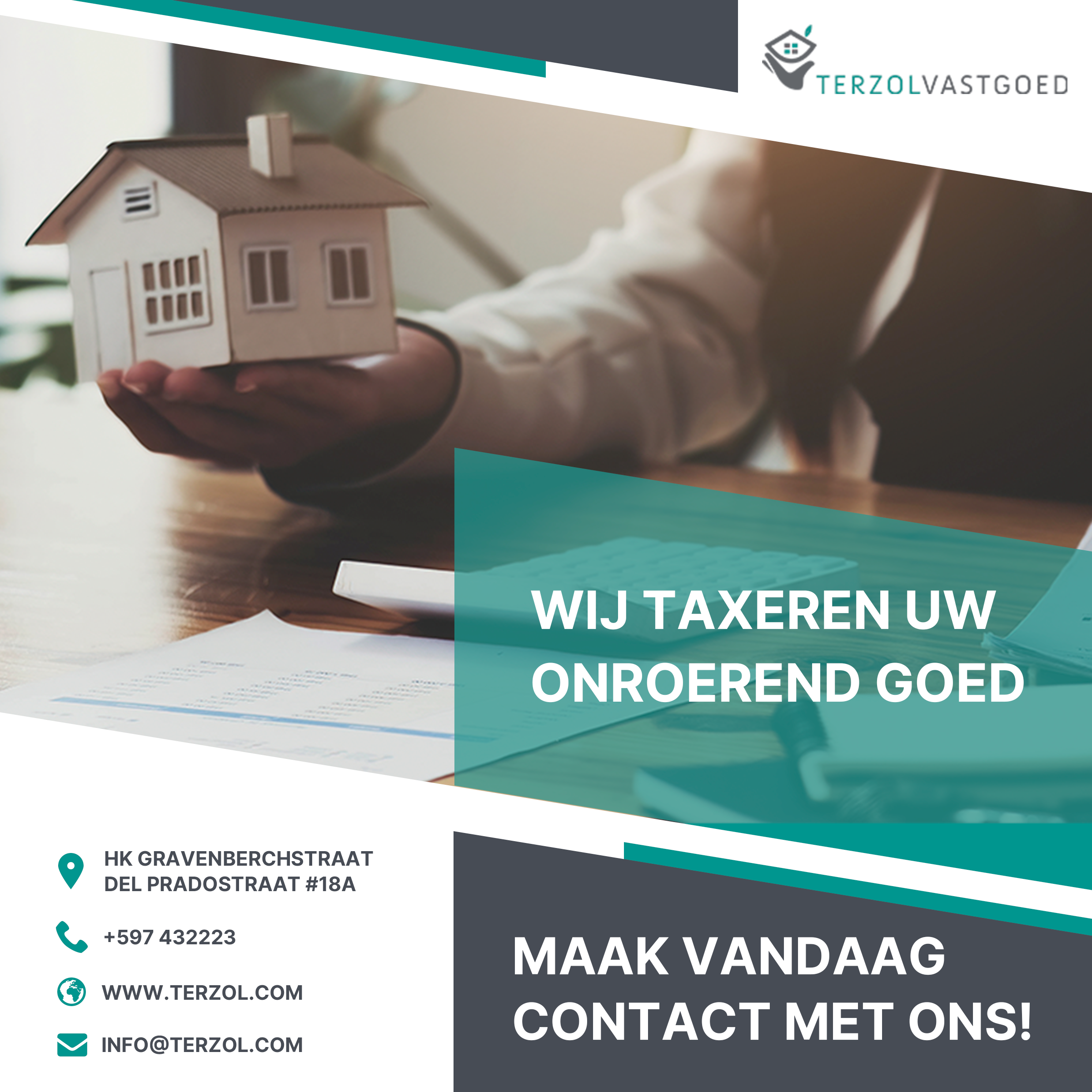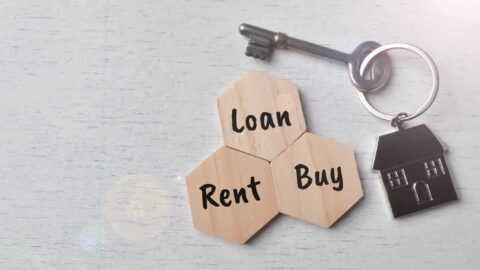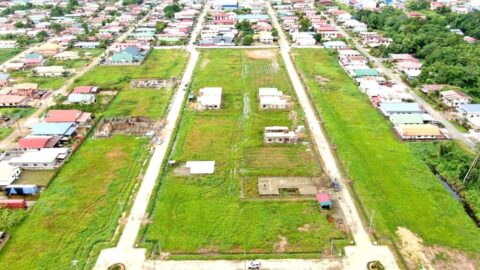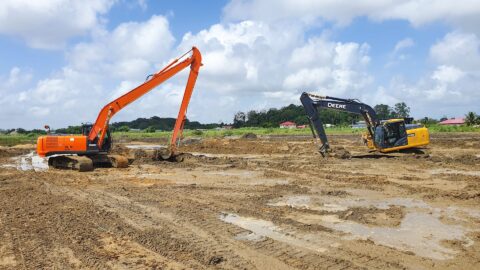Land conversion highlighted
As of 2017, Terzol Vastgoed NV offers integral services in the areas of purchase and sales brokerage, purchase and rental, appraisals, property management, subdivision, project development and consultancy to national and international, corporate and private clients in Suriname.
Terzol Vastgoed N.V. intends to publish a series of articles under the name ‘Grondzaken Nader Belicht’ in the coming period, with the following goal: to create or increase the awareness of all stakeholders – including brokers, developers, investors, landowners, buyers and government – about the various possibilities and legal certainties regarding land matters in Suriname. Joël Terzol, Senior Partner and CEO Terzol Vastgoed NV, started out as a financial professional in the Netherlands and developed himself as an ambitious and successful entrepreneur within the real estate market in Suriname.
Although buying and selling real estate runs in his blood, he has developed a passion for advising on all kinds of issues related to https://terzol.com/vastgoed/wp-admin/media-upload.php?post_id=5809&type=image&TB_iframe=1&width=753&height=844grondhuur, leasehold and estate matters within the real estate market.
In addition, Terzol anticipates the major developments in the Gold, Oil & Gas Industries in Suriname by developing projects in innovative ways to meet the modern needs of expatriates.
Terzol will cover the following topics in the series of articles, namely:
- Domain land
- Ground conversion
- Land tax
- Land Policy
- Estate mattersAppartment law
State’s view of its own role regarding land matters
The legislator has stated that land should be regarded as a common heritage of the population and therefore should be exploited, protected and managed in the most efficient manner.
This publication on land conversion aims to create or increase awareness among all stakeholders, but especially the State, about the various possibilities and legal certainties regarding land matters in Suriname.
Questions such as how will our lands be used?
And how the current policy will have to be adapted to the existing social reality, are essential.
Therefore I believe that reflection and a renewed thinking about the functioning of the Statenm.b.t.
land affairs is necessary.
The reason is that the current implementation of land policy – because of the existing risks and resulting legal uncertainty – is to the detriment of both citizens and the State.
In my opinion, there are great opportunities for growth in the State to solve the urgent problems.
To illustrate: Case study Mangrove Plan Our country has been struggling with the problem of coastal erosion for some time.
Hydrologist Prof.
Dr. Naipal is achieving successful results through his efforts through the Mangrove Plan, namely land reclamation.
The natural construction of a “gray-green” dam, consisting of the planting of mangroves, in the Weg naar Zee resort should thus serve as shore protection but also to protect agricultural areas lying along the sea.
This plan meets the need for a sustainable solution of which the Minister of Public Works has also proven to be a proponent.
But in order to make the best use of this sustainable solution, the government needs to make much more efficient use of the predominantly undeveloped plots on which the right of land lease rests, located along the shoreline on Brantimakka Road, and that is not happening now!
Given the eroding coastal area, the Ministry of Land Policy and Forestry (GBB) could consider better protecting the land by declaring the disposition of the current land tenants expired and declaring this area a protected area.
This can usually be done by the government on the basis of the land tenants’ failure to comply with the terms and conditions set forth in the decree, thus making state compensation inapplicable.
The Decree Issuing Domain Land is one of the laws that provides the legal basis for this in Article 32.
Land Matters in Historical Perspective
In the dissertation of mr.
Dr. A.C. AkkalRamautar entitled “Estate Problems in Suriname” focuses on the over settlement of rights to (plantation) lands in Suriname belonging to an undivided or unmanaged estate.
This dissertation research describes how, over time, lands in Suriname have been issued under various titles – such as full and bare ownership, allodial ownership and hereditary possession and ownership – under various conditions.
Given the historical course of the distribution of land matters in Suriname, it is emphasized that the manner in which the Dutch colonizer dealt with this was only to maintain the colonizer’s position of power.
As a result, it was never the intention to hand over the full ownership of the lands.
Therefore – also considering the research findings of Ms.
Akkal-Ramautar and the stimulation of economic growth in our country – it is well justified that a significant portion of the lands that were issued now concern undivided estates and belong to the State.
Current situation in Suriname
Our country has a varied system of legal titles to land, namely: Allodial ownership and hereditary possession
- BW ownership
- Leasehold (until 1982)
- Ground rent (after 1982)
Since Surinamese law is a derivative of Dutch law, it is essential to place the legal development regarding land matters in the aforementioned historical context.
Since 1982, 40 years have already passed since the inclusion of land leases in the estate prevention legislation.
Suriname as a young nation has continued to grow so that our country – with all developments placed in a different light – is in need of a new land policy.
The first article on domain land explained in detail that the State has title to lands belonging to the state domain and remains bare owner of all issued lands in Suriname.
Although the primary legal title in connection with the issuance of domain land is ‘ground rent’, the Decree on the Issuance of Domain Land also provides for the possibility of transferring ownership of domain land through a legal title such as purchase/sale, exchange or donation.
Land conversion refers to the conversion of limited rights in rem into ownership.
Ground conversion
When the subject of land conversion is discussed, it is therefore inextricably linked to the creation of a new land policy for the coming 10 years.
Since Suriname – in part due to global developments – is in transition in several areas, not only should we focus on land conversion but the new insights on land policy should also be included.
Land conversion is part of land policy and therefore part of this transition.
This requires awareness among all in society, but especially among policy makers.
Given the developments in the Gold, Gas & Oil Industries, new and better land policies are more important than ever!
Consider the protection of communities of indigenous and tribal peoples.
Land rights in the interior where our resources are located are not adequately protected.
In addition, there is a need to include the apartment right in the Civil Code for affordable housing for the benefit of social housing and the housing needs of senior citizens, among others.
But also taking into account environment-related legislation.
It should be clear that, regardless of which government is in power, adaptation of our current laws and regulations regarding land matters to the constantly changing social reality within this context is inevitable.
I emphasize – together with the Minister of GBB – that given the size of Suriname’s territory and available domain land, the State is in a position to grant every Surinamese a piece of land in ownership.
Mentioned transition is motivated by several principles, such as:
- The legislature has stated that land should be considered a common heritage of the people and therefore should be exploited, protected and managed in the most efficient manner.
- Foreign investors wish to invest on proprietary land.
It is not attractive to invest on land subject to a limited right in rem.
One of the risks of land conversion is that the State of Suriname sells its bare property, making these property parcels attractive to foreign investors and entrepreneurs.
In my opinion, it is important to prevent foreign companies from buying large pieces of our Surinamese territory in ownership.
It would be a good outcome if there is shared ownership with a Surinamese company or natural person.
This way, the foreign investor has more legal security than just the limited right in rem of land lease.
Also, our property rights are not bought up by foreign investors and part of the right still remains in Surinamese hands.
In practice, it is a realistic problem not to be underestimated, that by doing nothing, the State is being too tolerant towards foreigners and not protecting its own Surinamese people enough.
State finances land conversion
Land conversion is an absolute necessity, allowing the State to generate a huge one-time source of income through the sale of domain land in these times of large deficits in the State coffers.
Moreover, converting limited rights in rem into ownership leads to more legal certainty for land users.
It is recommended that the State finance land conversion so that the land user does not have to go to the bank and to keep the conversion costs low.
This will allow the State to generate money over a much longer period of time from the land relinquished to it as well as receive the periodic land tax as tax to be collected directly.
I would also like to mention two aspects that are related to the subject of land conversion, namely land tax and the amendment of legislation regarding the expropriation of property plots.
Land tax
I emphasize that land conversion should always take place in conjunction with the application of land tax.
The State should establish in advance in policy what the funds obtained from land tax should be spent on.
For example, stimulating housing construction.
Also, offering a start-up subsidy under the condition of an interest-free repayment obligation and to support entrepreneurs who cannot borrow money from the bank due to money shortages in the country are examples.
It is therefore recommended that the State introduce land tax for all land users, with the revenue also being a periodic source of income.
The issue is not who pays, but that payment is made.
It is about the principle that “the broadest shoulders bear the most.”
For example, a resident with a 500m2 plot from a neighborhood with financially less well-off people feels paying the land tax less, than someone living on Anton Dragtenweg with a generous plot with large area.
In fact, for calculating land tax, it is only important to know what the land title is and how big the land is.
Both land conversion and introduction of land tax contribute to the incentive to develop land in Suriname.
If the State chooses land conversion, we must realize, that the State is selling its bare property and also giving up its legal securities!
We must also realize that if there are compelling reasons that the State needs this land for public benefit again, the State can expropriate this full ownership of the other again.
For substantiation, reference is made to the Expropriation Act 1904 and the Expropriation of Urban Development and Housing Facilities Act 1948 (OSoW Act) whereby the Minister can declare the land tenant’s right wholly or partially forfeited for failure to comply with the agreements with the State as bare owner.
Adjusting expropriation laws.
The government must be able to expropriate property land under the expropriation laws.
The Expropriation Act of 1904 and the OsoW Act of 1948, provide sufficient guidance for this purpose.
These laws should distinguish between allodial property and BW property, so that it is clear what type of property is involved.
Expropriation of property land always involves compensation and a procedure to be followed by the State.
The purposes of expropriation stated in the OSoW Act are pursuant to Article 1 OsoW Act:
- for the purpose of implementing or maintaining the actual condition in accordance with a zoning ordinance;
- t.b.v. areas in interest of housing facilities;
- for the purpose of a building plan to be implemented in the interest of housing supply.
Conclusions
- The State has all the ingredients – namely land with a large market value – to generate development of the Surinamese domain land.
What is important is that the State has the right vision of its own role to exploit, protect and manage the land as a common heritage of the people in the most efficient way through a renewed land policy 2021-2031.
Is the design and management of the State ready for that? - The State would do well to fund the low cost of land conversion.
Land conversion is an absolute necessity, which can provide a one-time source of revenue for the State to supplement State treasury deficits.
Combined with the introduction of land tax for all land users, State revenues will also be guaranteed for the longer term.
In contrast, land users with limited rights in rem will obtain absolute ownership. - The State would do well to amend the expropriation laws regarding possible expropriation of property plots to be acquired.
- The ensuing situation at Road to Sea illustrates how much it is advisable, that the State should take its responsibility for the common good and intervene by using the possibilities offered by legislation!
Masterclass
Finally, I wish to provide support in sharing knowledge and developing skills in land matters.
The intention is to develop and offer three Master Classes in the upcoming period.
Further information will follow.
Joël Terzol [email protected]















